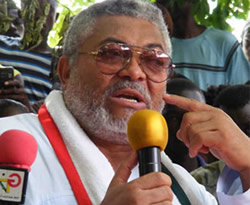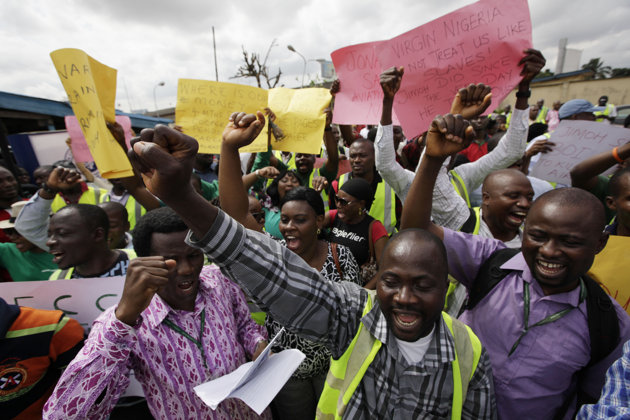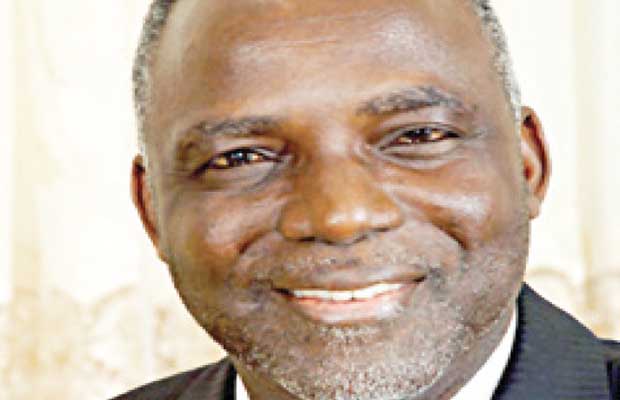Chanting miners wielding machetes, clubs and spears marched from shaft to shaft of South Africa's beleaguered Lonmin platinum mine Monday, trying to intimidate the few workers who reported for duty in the fourth week of a crippling strike whose impact has already included dozens of miners killed by police.
At one point on their 10-kilometer (six-mile) trek, a striker lashed a whip at a man they accused of reporting for work. He took off across the scrubland with dozens of men waving machetes and clubs in pursuit. The man was saved by police officers who pulled him into their moving vehicle.
Meanwhile, labor unrest spread in the country, with an illegal strike by more than 10,000 workers halting operations at the west section of Gold Fields International's KDC gold mine.
The strikes are rooted in rivalry between the main National Union of Mineworkers and a breakaway union.
At the KDC gold mine, for instance, spokesman Sven Lunsche said the strike started Sunday night and that senior managers met Monday with strikers demanding the removal of NUM shop stewards and a minimum monthly wage of R12,500 ($1,560).
Some 12,000 miners at east KDC staged a weeklong illegal strike to demand the removal of NUM shop stewards that ended Sept. 3.
At a second platinum mine, Implats, 15,000-plus workers are demanding a 10 percent pay raise although they are continuing to work, spokesman Johan Theron said.
London-registered Lonmin PLC said just 6 percent of its 28,000 workers turned up Monday morning at its mine in Marikana, northwest of Johannesburg. Mine drivers drove around looking for workers to pick up, but the buses returned to the mine empty.
In Marikana, hundreds of chanting strikers descended on one after another of the Lonmin mine shafts, chanting anti-government songs and blaming President Jacob Zuma for the police killings. They were monitored by armed police in riot gear, some in armored cars, others on foot.
As strikers approached Lonmin's Hossy shaft, police escorted a speeding cavalcade of buses and vans carrying working miners and trucks with explosives as they rushed to get from one mine shaft to another.
Strikers have threatened to kill any miners or managers who do not respect their demand for all work to stop until Lonmin agrees to a monthly take-home pay of 12,500 rand ($1,560), about double their current wages.
Lonmin had hoped many more miners would come to work since a peace accord was signed last week with three major unions. But it was rejected by a breakaway union and nonunion strikers.
The government brokered the peace deal after police shot and killed 34 miners and wounded 78 on Dec. 16 at Marikana, a mass shooting reminiscent of apartheid-era days that has traumatized the nation of 48 million.
Ten people were killed in the week before the shootings: two police officers hacked to death by strikers, six union shop stewards and two mine guards burned alive in their car.
The Legal Resources Centre, meanwhile, announced that it has hired forensic experts and pathologists to investigate the Marikana violence on behalf of the South African Human Rights Commission.
The commission has stepped in following local news reports alleging that some miners were shot as they tried to surrender to police, others were shot in the back as they ran away from the police fire, and some were run over and killed by police armored cars.
Police and government officials have refused to comment on the allegations, saying they must await the results of a judicial commission of inquiry that is to report to Zuma in January.
Miners told The Associated Press they are getting desperate and do not have enough money to feed their families because of the no-work, no-pay strike. One said a loan shark is refusing to give money to any but long-time customers.
Still they said they remain resolute and will not return to work until their wage demand is met. The miners refused to give their names to a reporter.
The National Union of Mineworkers said the Marikana strikers had gone around Sunday night threatening anyone who went to work.
Negotiations between mine managers, several unions and representatives of strikers who do not want to be represented by any of the unions were postponed for 24 hours because the strikers' representatives said they did not know about the meeting, Lonmin spokeswoman Sue Vey said. She said the talks would start off by working out a framework for salary negotiations and probably would last several days.
But Gideon du Plessis, general secretary of Solidarity union representing mainly white mine workers, said the strikers' representatives sent a message saying their position had not changed and they would not go back to work until Lonmin agrees to the salary demand.
The last of the miners killed by police were buried during the weekend, one in Lesotho and three in South Africa. The Daily Dispatch newspaper quoted a family member as saying that one of them, Thembelakhe Mati, was wounded in the shooting and got away to hide in a shack, fearing he would be arrested if he went to the mine hospital for treatment.
Half a dozen buses carrying mourners who had attended the funerals in far-flung parts of the country returned Monday to a shantytown of tin-walled shacks without water or electricity near the mine


















